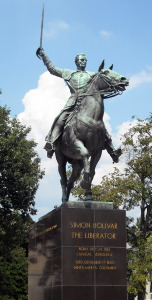Latin Americans of the World, Unite?
 It has been nearly two centuries since Simón Bolívar proposed the creation of a league of American republics against the imperial powers at the time, and yet the sentiment of a unified Latin America has hardly faded away. Bolívar’s dream is alive and well in the wealth of political and economic alliances that currently operate in the region. Adopting this spirit of solidarity, President Evo Morales’ recently made yet another romantic call for an "alliance of the excluded" at the Vatican—a plan for a new “international economic order based on principles of equity and cooperation between peoples”. Unfortunately, many of Latin America’s regional organizations seem just as ostentatious and unrealistic as the Bolivarian rhetoric that inspired them.
It has been nearly two centuries since Simón Bolívar proposed the creation of a league of American republics against the imperial powers at the time, and yet the sentiment of a unified Latin America has hardly faded away. Bolívar’s dream is alive and well in the wealth of political and economic alliances that currently operate in the region. Adopting this spirit of solidarity, President Evo Morales’ recently made yet another romantic call for an "alliance of the excluded" at the Vatican—a plan for a new “international economic order based on principles of equity and cooperation between peoples”. Unfortunately, many of Latin America’s regional organizations seem just as ostentatious and unrealistic as the Bolivarian rhetoric that inspired them.
In the economic realm, the first Latin American organization to come to existence was the Inter-American Development Bank (IDB), an organ founded in the 50s as a charter of its judicial and political predecessor, the Organization of American States (OAS). The IDB operates through loans from industrialized member countries to developing Latin American nations, aiming to address Latin America’s economic lag in comparison to industrialized nations. It would be difficult to argue that Latin America’s strength is producing manufactured goods; on the contrary, its relatively cheap raw-material exports didn’t generate enough revenue to pay for more expensive, manufactured imports. This problem, coupled with ill-advised economic policies and a debt crisis in the 1980s, led Latin America to an economic downward spiral. It seems that the region has not yet found the balance between government protectionism and free trade that will ultimately bring economic development, and many have turned to other alternatives.
Since then, many Latin Americans have sought regional economic integration, as to avoid being swept out of competition by industrial powers, but at the same time maintaining trade between Latin American countries themselves. Mercosur, a trade alliance born in the late XX century, is currently composed by Brazil, Argentina, Paraguay, Uruguay, and Venezuela. These countries share a common tariff and trade policy towards non-members. While trade in relation to the countries’ total merchandise never rises above 20%, their combined economies make the fourth largest trading bloc in the world, immediately following the EU.
However, Mercosur’s recent lull in free trade due to Brazil’s and Argentina’s domestic protectionist policies, and the emergence of the Pacific Alliance have amounted to skepticism from many regarding the old trade alliance. This new Pacific Alliance, which was signed about a year ago between Chile, Colombia, Mexico, and Peru, aims to promote free trade among nations that have signed trade agreements with the EU and the US and seek to expand their operations into the Pacific. Three stock markets are at work in this trade agreement, and are seen as the basis of the alliance’s economic integration. Its focus on trade liberalization and active integration make Pacific Alliance a more realistic and beneficial form of regional integration.
Unlike these trade agreements, which although varying in nature, all follow a largely economic approach to integration, organizations like ALBA seek to integrate Latin America politically. ALBA, which roughly takes its name from Simón Bolívar, is an alliance comprised of countries that, more than establishing trade policies with one another, look for political affinity: namely socialism and populism. It was founded by Cuba and Venezuela, under the leadership of Chávez as a call for Latin Americans to unite under “Bolivarian socialism”. Three--consecutive-term socialist president Evo Morales is an outspoken supporter of ALBA, making his remarks in the Vatican little more than an extension of oft-quoted Bolivarian rhetoric.
If Bolívar’s dream of a single Latin America is the one projected by pink-tide organizations like ALBA, many Latin Americans would dismiss it not only as being unrealistic but of repressive and un-democratic. However, the conception of an integrated region is perhaps best achieved through economic agreements that lead to meaningful civil interactions, instead of political groups that flee from economic realities.
